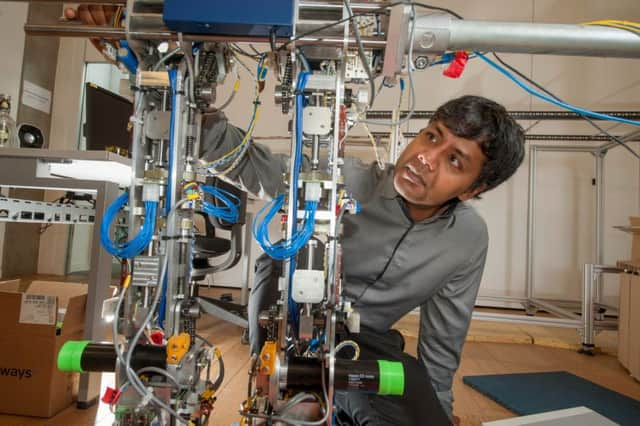No need to fear robots taking our jobs, says scientist


Sethu Vijayakumar, professor of robotics and director of the Edinburgh Centre for Robotics, is taking part in pioneering work to look at where and how humans and robots will work together in the future.
The expert says we are going to have to learn to share control with the devices, which will be used in a wide variety of fields – from being a source of cheaper and effective labour to the machines carrying out invasive surgery on us in our hospitals.
Advertisement
Hide AdHis pioneering team – a world leader in the field – is looking at the best ways to make robotic technology more accessible to humans and enable the devices to interact better alongside a human worker.
Prof Vijayakumar, a judge on the hit BBC show Robot Wars, said: “Great challenges remain in the operation of robots in domains outside well-controlled laboratory situation. Testing and validating autonomous behaviour of robots in real world environments is a significant challenge.”
As robots can be programmed to follow precisely a sequence of movements, they are able to carry out many types of simple repetitive work. But Prof Vijayakumar believes robots can do so much more – and that humans have to stop worrying about losing their jobs to the devices and rather accept that they could be sitting next to one at work.
He says the key is to make the robots autonomous – being programmed to think for themselves while “still having humans in the loop”.
He said: “We need to start using robots very much as tools – like the way we use PCs for writing and mobiles for communication – that help us do our chores and our jobs better.
“We can make many of our machines we work with ‘idiot-proof’ and remain in overall control of what they do.”
Advertisement
Hide AdAnd he says that rather than taking people’s jobs, robots will one day be able to enhance someone’s work.
He said: “Robots will be more economically viable and much more socially acceptable when they work with shared control with humans. In fact, they are very much designed to be effective co-workers, taking over dull, dirty and mundane things that are typically easily to automate and require less cognitive prowess – thus freeing up time and resources.
Advertisement
Hide Ad“Yes, robots will be better at picking chocolate out of an assembly line and stacking it into boxes at remarkable speeds, but surely there are much more fulfilling jobs for humans to work on. So let robots carry out precise and repeated movements while humans focus on context.”
Vijayakumar also highlighted how we have to embrace the potential benefits, included cheaper products, a robotics revolution will bring in the near future.
Prof Vijayakumar sees robots being used in various domains, including health care, carrying out assisted surgery, in drilling projects where they can be programmed to manoeuvre different tools into different specific areas and in construction and car manufacturing where repeated movements are needed.
But he says humans will always have a part to play in any project where critical key decisions need to be made – and believes that is what we should be concentrating on.
“The future is very much about shared working, not about one being better than the other,” he said.
“Ultimately, what lies ahead is a new world which can function with new capabilities from robots. New opportunities will be created, ones we probably can’t fathom out as yet. But we need to embrace the robotic future and learn to live with the fact that working alongside them is in our very best interests.”
Advertisement
Hide AdProf Vijayakumar will be awarded the 2015 Tam Dalyell Prize Lecture Award for excellence in engaging the public with science and will deliver a lecture at the Edinburgh International Science Festival, which runs to April 10.